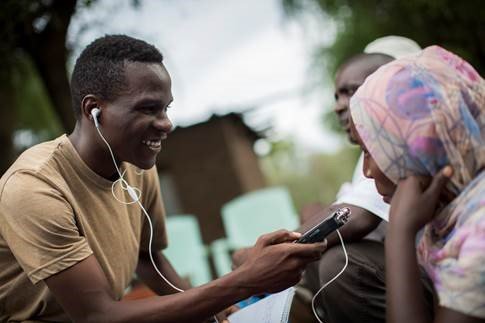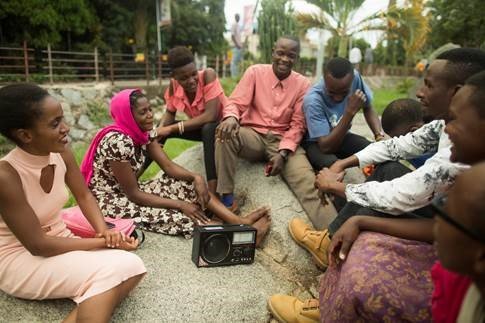Investments that Pay Off: A Look at Youth-Led Radio Shows in Africa
Lessons from Our Partnership with Children’s Radio Foundation
“I have many opportunities now. Community members can see me as a role model. I didn’t know that a city youth could participate in agriculture and use it as a business to succeed.”
– Mariam Miraji, youth-led radio program listener, 19 years old, Dar es Salaam
What happens when you put radio programming in the hands of young people? Through a partnership between the Mastercard Foundation and Children’s Radio Foundation (CRF), we found there are pay-offs for organizations delivering employment and financial inclusion programs as well as the young people they are trying to reach.
The partnership involves delivering youth-produced radio shows through a network of 10 radio stations in two countries across Africa. Content focuses on employment opportunities in agribusiness and financial literacy. Young reporters receive mentorship and training, broadcast dialogue on challenges common to youth in their communities, and share helpful information on building skills.

Children’s Radio Foundation Youth Reporter Paul Lukas interviewing young farmers in Mwanza, Tanzania © 2018 Sydelle Willow Smith / Makhulu.
Beyond the benefit to participants who receive training on how to run a radio show, many listeners of the youth broadcasts have started their own businesses in agriculture and developed a greater understanding of financial services. Adults have taken direction from the young broadcasters and are starting similar programs for older generations in their communities. Finally, financial service providers have made loans and small business creation more approachable to a wider youth audience.
Impact Stories
-
Normalizing Women’s Participation in Agribusiness in Mwanza, Tanzania
For radio broadcasts showcasing youth agripreneurs in their community, the Metro FM youth reporters in Mwanza, Tanzania chose to focus on young women in the sector to normalize women’s participation in agriculture in the minds of their listeners.
In their research for the show, they found that many respondents, both men and women, noted that agriculture is “men’s work,” and that women are not cut out for the job. To counteract this, they profiled two young women with growing enterprises in agriculture.
To round the broadcast off, a youth employment expert from SNV came to the studio to speak about local and national trends in youth agribusiness, and shared opportunities available to youth in the Mwanza region.
See video below to learn more.
Success for Financial Service Providers
Financial institutions such as BRAC and PRIDE provide financial education, facilitate access to loans, and offer coaching to young people on how to turn those loans into successful businesses in Mwanza and Zanzibar.
Both organizations supported youth reporters in Mwanza and Zanzibar who broadcast stories and experiences of youth who accessed loans to start small businesses. The youth broadcasters spelled out the requirements, benefits, and potential risks to radio listeners.
They found that peer-to-peer radio was a productive extension of their work, bringing human experience to loans and small business creation, while also allowing them to advertise their services to a wider audience.
Broadcasting pathways to youth employment in Tanzania from Children’s Radio Foundation on presents Metro FM youth reporters in Mwanza, Tanzania who are normalizing women’s participation in agriculture in the minds of their listeners.
In the past, financial literacy and agricultural-focused radio programs have often excluded youth voices and experiences, failing to create spaces where youth can discuss and support one another in common challenges. Without dialogue and local content, many of these radio-driven campaigns struggle to achieve a “personal connection” with the target group (Taking Stock, Mastercard Foundation 2011). In the case of our initiative with CRF, youth engagement meant changing the way radio is structured, the topics, the format, and who delivers it.
Could this change perceptions of agriculture in Tanzania?
Agriculture is a critical sector for employment, and yet, is perceived as “labour-intensive backbreaking work” (UNCDF, 2016). With 800,000 young people entering Tanzania’s labour market each year and only six percent able to secure employment in the formal sector, the perception of agriculture needed to change.

A radio listeners group for the Step Up youth radio show on Metro FM, Mwanza, Tanzania © 2018 Sydelle Willow Smith / Makhulu.
We saw an opportunity to empower youth by giving them information to select their own pathways to fulfilling employment in agriculture and to connect them with training programs through radio.
Why radio?
- Radio can deliver simple, personalized, and convenient messages to targeted segments of youth on loans and starting small businesses in agriculture.
- UNESCO estimates the community radio sector in Tanzania can reach a total of 16 million listeners, consisting of those who would “otherwise have been left out by mainstream media” (2016).
- Radio provides space for young people to form opinions about local issues that affect daily life and communities. Community radio stations across Africa are often vital spaces where community members have an opportunity to share their views.
Why youth-led radio programs?
85%
Young listeners who gained knowledge and understanding of financial services and agribusiness as a viable business.
80%
Young people who took action after tuning in, applying information from the radio show to their life, resulting in activities including opening bank accounts, accessing training opportunities, and setting up small agri-businesses.
27%
Youth who pursued agribusiness-related opportunities after they were referred to on the radio show, including growing crops on a small plot of land, writing a business plan for transporting goods from the village to city, and starting a chicken project.
Profiles of youth at work were particularly inspirational when they detailed how the young person gained the skills needed for their job.
In the agricultural sector, several young people noted a better understanding of the diversity of opportunities available to them, and how they might start their own small agribusinesses.
Adults Taking Direction from Youth
Broadcast techniques from youth shows on finance and agriculture inspired adult presenters to host similar shows for adults in the community.
“The level of interaction with the listeners reached by the youth show encouraged other presenters to follow their lead and to put time in their schedules for getting feedback and meeting with listeners as the youth did recently. They want to make sure they become as close to listeners and stakeholders as the youth are.”
– Milimani FM, Mwanza, Tanzania
Reach Youth Through Radio: A How to Guide
- Make it personal: Ensure that all financial inclusion and job readiness training, broadcasts, and youth outreach activities speak directly to the experiences and lives of young people and reflects opportunities available in their communities.
- Focus on success: Profile youth at work, explore skills required in local industries, and facilitate open-ended discussions around community challenges.
- Draw connections between financial inclusion and future goals: Help youth establish goals for themselves, their families, and their communities. Demonstrate how financial inclusion can help young people achieve these goals.
- Direct young people to opportunities in their community: Let young people know about the training, skills development, and employment opportunities in their communities.
- Connect with community-based organizations: Build relationships with organizations in the community that can share relevant information in their own broadcasts and outreach. Your program will be better informed and more sustainable.
- Create spaces for multi-generational conversations: Broadcasts can build community support for youth by including adults. Partnerships with government, the private sector, and youth employment organizations can identify adults and broaden the relevance of programming to a larger community.
Learn more about CRF ‘s radio campaign model in the Financial Inclusion Youth Toolkit.
About the Partnership
The Mastercard Foundation partnered with CRF to create the Kilimo Mtaji (Agriculture makes sense) initiative, a pilot to identify how peer-to-peer youth radio campaigns can make an impact at the intersection of financial inclusion and agribusiness among young men and women in the Democratic Republic of Congo (DRC) and Tanzania. The pilot set out to identify how community radio can support youth to prepare for and find meaningful work in their local communities, reaching an estimated radio audience of 6 million youth listeners in Tanzania and DRC. It is part of the youth employment and entrepreneurship initiative.
About the Authors
Dina Randrianasolo is Program Manager, Mastercard Foundation.
Michal Rahfaldt is Executive Director, Children’s Radio Foundation
Subscribe to Our Newsletter
To stay up to date with the Mastercard Foundation, sign up for our monthly newsletter. Get youth voices, impact stories and news and announcements all direct to your inbox.
*By signing up for the Mastercard Foundation’s newsletter, you accept our privacy policy.


